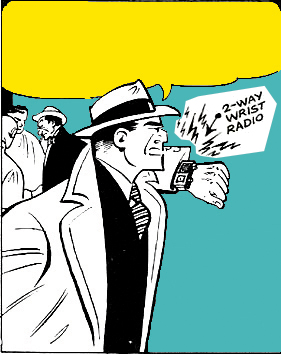TATT: Connecting The Unconnected -
Smart Living For All in Trinidad and Tobago
By The Telecommunications Authority of Trinidad and Tobago

LINKAGE Q3 (2024) - OPPORTUNITY IN ADVERSITY
D
ick Tracy was a ‘fictional police detective’ in an American comic which came to fame in the 1930s. Many may argue that he was a pioneer in his field of law enforcement, solving his cases with ‘advanced gadgetry’. Tracy was often seen using two-way radio communication, speaking into a gadget on his wrist.
In that era, when this comic strip character was conceptualised, besides its creator Chester Gould, how many thought that there could ever be a time when we would be able to communicate with others by speaking into gadgets on our wrists, as we can today?

The use of ICTs is central to so many of our daily tasks. Certainly, in today’s world, research for just about any project starts with a trip to the ‘online library’ of your preferred search engine. In 2006, the word ‘Google’ was accepted into the Oxford Dictionary because it was the norm to simply say, “…google it”, when referring to searching just about anything online. We are seeing an increase in the demand for access to services and products from the palm of our hands. We are moving towards a gigabit society.
In an article titled Building a Gigabit Society: An Inclusive Path Towards its Realisation, authors Wolfgang Bock and Maikel Wilms refer to Europe’s ‘transformation path towards a Gigabit Society’ and the digital empowerment to be derived, as a Gigabit Society would create access to new and innovative products and services, both private and public. These services include ‘e-government, e-health, e-learning and the Internet of Things’, but what was critical in the view of both Bock and Wilms was the need for ‘cutting-edge connectivity’.
The Telecommunication Authority of Trinidad and Tobago (TATT) regulates this country’s telecommunications and broadcasting sectors. Our mandate is to ensure we bridge the digital divide by providing our citizenry with access to reliable and affordable Internet service. TATT’s role is to foster an environment of digital inclusion. Operators must be empowered to conceptualise innovative, creative and affordable technological solutions for their consumers that address the ‘cutting-edge’ connectivity that will propel us toward a Gigabit Society.
TATT believes in smarter living for everyone and has worked to improve the country’s ICT Development Index (IDI) as assessed by the International Telecommunications Union (IDI). The IDI shows that progress has been made towards universal and meaningful connectivity and is defined as the ability for everyone to go online under optimal conditions, at an affordable cost, anywhere and anytime they need.
Today, in 2024, the country’s IDI assessment by the ITU is 78.8%, up 3% from 76.6% in 2023.
But there is a proverbial boulder in the path towards a Gigabit Society. Whilst consumers already have access to an ultra-fast broadband network that can facilitate upload and download of data at incredible speeds, there are gaps in access to these networks that are hindering the progress of our national digital development.

In 2021, TATT conducted its Digital Inclusion Survey, the third for Trinidad and Tobago since 2007. This survey assessed the extent of the digital divide. It informed universal service projects and other initiatives to reduce these gaps, promote ICT reach, and improve all our citizens’ lives through technology. Section 2 (1) of the Telecommunications Act, Chap. 47:31 (the Act) defines universal service as the provision of telecommunications services throughout Trinidad and Tobago, considering the needs of the public, affordability of the service and advances in technology.
A key finding of this survey based on Trinidad and Tobago’s ICT Development Index (IDI) was that this country was taking the necessary steps in the right direction to close that gap between those with and without Internet access. This survey also showed increased access to ICTs and subscriptions to ICT services, including mobile subscriptions and fixed internet subscriptions.
The findings of the survey also highlighted critically important data that needs to be addressed in our country’s thrust towards developing a Gigabit Society.
Therefore, the spotlight was put on those communities across Trinidad and Tobago with the lowest IDI scores.
The Digital Inclusion Survey found that only 1% of persons living with disabilities (PWDs) used digital government services, whilst just 57.3% of PWDs owned a mobile phone and that the elderly, many of whom are averse to change and resistant to using ICTs, are unable to participate in a fully digital society. And so, to achieve the benchmarks set out in the definition of a Gigabit Society, the citizenry must have universal access to ultra-fast broadband networks at both the personal and public levels and must see the implementation of technology to improve customer experience and service delivery in both private and public enterprise.
On 18th June 2024, TATT launched its first Universal Service Broadband Access Project in the St. John’s Parish of Tobago in partnership with Columbus Communications Trinidad and Tobago Limited (FLOW), the Tobago House of Assembly and the Ministry of Digital Transformation. This broadband infrastructure project stands to benefit more than 265 households in the rural communities of Parlatuvier, L’Anse Fourmi and Bloody Bay by providing high-speed internet of up to 1Gbps download speed.
The Universal Service Fund was intended to ensure that low-income persons, those living in remote communities, persons with disabilities and other vulnerable groups benefit from basic telecommunications services. Universal access can only be achieved when 100% of this country’s population can access affordable, basic telecommunications services on either an individual or shared (public access) basis, for example, at Wi-Fi access or community access centres, Internet kiosks, etc.

In our Digital Inclusion Survey, St. John’s Parish was identified as one of these communities with the lowest local IDI scores, providing evidence of an ICT access gap. TATT’s Universal Service Regulations define the access gap as those geographical areas where it is not economically feasible for a concessionaire to establish networks and services.
TATT’s other Universal service projects include collaborating with the Government of the Republic of Trinidad and Tobago for a National “Free” Wi-Fi Initiative (TTWiFi) at Transportation hubs, national libraries, public schools and health institutions nationwide. Through this partnership, there is connectivity at 12 transportation hubs at various PTSC terminals and ferry terminals, 23 national libraries, 64 health institutions and 61 public primary schools. TATT is also working on establishing five community-based ICT access centres within Trinidad and Tobago by 2025. To date, we have implemented Public Wi-Fi access at 160 Public Access Sites, with rollout scheduled to begin at an additional 66 Public Health Institutions.
TATT has also implemented an initiative for PWDs that facilitates the provision of subsidised smartphones to persons with visual and hearing impairments. More than 1,239 persons with disabilities have received subsidies so far.
T
ATT’s objective is to ensure that everyone who falls within the access gap has access to telecommunications services and can reasonably enjoy the benefits of smart living. To achieve a gigabit society, we need a digitally connected society first.
The rapid adoption of and insatiable appetite for technological advancements has seen the global society make a quantum leap from the ‘Dick Tracy’ days. History has taught us, or maybe Gould, that once we can envision it, there is the real possibility that it can be achieved and maybe in our lifetime. As we step toward a Gigabit Society, TATT is committed to working with its concessionaires in a technology-inclusive approach to ensure no one is left behind.